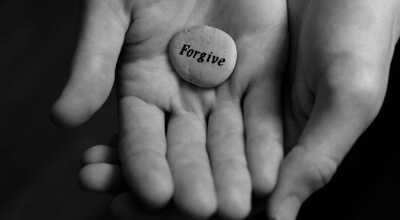Don’t Forget Yourself
It’s one thing to have the breakthrough regarding others—totally forgiving them and destroying the record of their wrongs. It is quite another to experience the greater breakthrough—total forgiveness of ourselves.
Forgiving yourself means to experience the love that keeps no record of your own wrongs. This form of love is a choice, as we have seen, and to cross over to the place where we choose to forgive ourselves is no small step.
So many Christians say: “I can forgive others, but how can I ever forget what I have done? I know God forgives me, but I can’t forgive myself.”
We must remember that forgiving ourselves is also a lifelong commitment. In precisely the same way that I must forgive others every single day—which is why I read Luke 6:37 daily—I must also forgive myself.
Forgiving ourselves is also a daily process. We may wake up each day with the awareness of past mistakes and failures—and fervently wish that we could turn the clock back and start all over. We may have feelings of guilt—or pseudoguilt if our sins have been placed under the blood of Christ. But our enemy, the devil, loves to move in and take advantage of our thoughts. That’s why forgiving ourselves is as important as forgiving an enemy.
Forgiving yourself may bring about the breakthrough you have been looking for. It could set you free in ways you’ve never before experienced.
This is because we have been afraid to forgive ourselves. We cling to fear as if it were a thing of value. The truth is, this kind of fear is no friend but rather a fierce enemy. The very breath of Satan is behind the fear of forgiving ourselves.
Jesus knows that many of us have this problem. This is a further reason He turned up unexpectedly after His resurrection where, behind closed doors, the disciples were assembled both in terror and in guilt. Jesus not only wanted them to know they were totally forgiven, but He also wanted them to forgive themselves.
Instead of reminding them of what they had done, He spoke to them as if nothing had happened. He said, “As the Father has sent Me, I also send you” (John 20:21).
This gave them dignity. It showed them that nothing had occurred that would change Jesus’ plans and strategy for them. He had already sent a signal to Peter, who had denied knowing Jesus, through the angel who said, “But go, tell His disciples—and Peter—that He is going before you into Galilee; there you will see Him, as He said to you” (Mark 16:7).
And yet all of them had “forsook Him and fled” (Matt. 26:56). After His crucifixion, they felt utterly unworthy. And then the risen Lord showed up and assured them of a future ministry!
I have often thought that one of the reasons Peter was so effective on Pentecost was that he was keenly aware of having been forgiven. He knew full well that, just a few weeks before, he had denied Jesus to a little servant girl! He would never forget the look on Jesus’ face when the rooster crowed and that he “went out and wept bitterly” (Luke 22:61-62). It was real antidote to self-righteousness!
When Peter preached to his fellow Jews on Pentecost, there was no trace of smugness or condescension. Knowing he was a forgiven sinner kept him from usurping God’s glory on that day. God alone received the glory for those 3,000 conversions.
I remember one Sunday morning just before I was to preach at the 11 o’clock service. I had an argument with my wife, Louise. I should never have done it, but I stormed out, slamming the door in her face. Before I knew it, I was bowing my head on the upper platform at Westminster Chapel before several hundred people.
I don’t know what they were thinking, but I know what I was thinking: I should not be here. I have no right to be here. Lord, how on earth could You use me today? I am not fit to be in this pulpit.
It was too late to send a note to Louise saying, “I’m sorry.” There was no way to resolve the situation at that time. I could only ask God for mercy and try my best to forgive myself. I assumed I was about to deliver the biggest flop of a sermon in the history of Westminster Chapel. Never in my life had I felt so unworthy.
But when I stood up to preach, I was not prepared for the help I received. God simply undergirded me and enabled me to preach as well as I ever had!
That is partly why I think Peter was so successful on Pentecost. When we are emptied of all self-righteousness and pride we enable God to move in and through us.
Let the Past Be … the Past
The sweet consequence of not keeping a record of all wrongs is that we let go of the past and its effect on the present. We cast our care on God and rely on Him to restore the wasted years and to cause everything to turn out for good.
We find ourselves, almost miraculously, accepting ourselves as we are (just as God does) with all our failures (just as God does), while knowing our potential to make more mistakes. God never becomes disillusioned with us; He loves us and knows us inside out.
Moses had a past. He was a murderer (see Ex. 2:11–12). But years later he would proclaim the eighth commandment: “You shall not murder” (Ex. 20:13). David had a past, but he also had a future after his shame: “Then I will teach transgressors Your ways, and sinners shall be converted to You,” he wrote (Ps. 51:13). Jonah deliberately ran from God, but he was still used in an astonishing revival (see Jon. 3).
Peter’s disgrace—denying Jesus—did not abort God’s plans for him. But all these men had to forgive themselves before they could move into the ministry God had planned for them.
Can you do that? Having forgiven others, it is time to forgive yourself. That is exactly what God wants of you and me.
It is long overdue: Let the past be past—at last.
R.T. Kendall was the pastor of Westminster Chapel in London for 25 years and is the author of more than 40 books, including his latest release, Jealousy: The Sin No One Talks About. For more information, visit his website at rtkendallministries.com.
Watch R.T. Kendall share how to totally forgive someone who has offended you at forgiveness.charismamag.com







Leave a Comment
You must be logged in to post a comment.